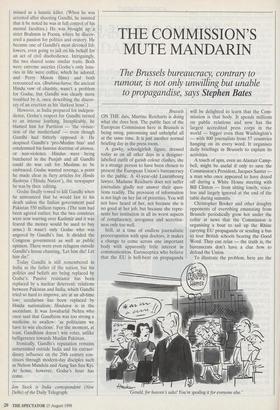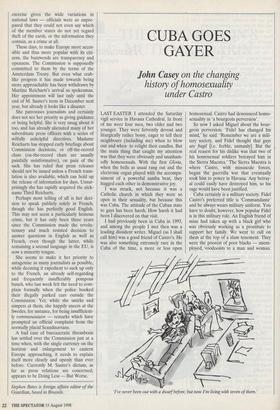THE COMMISSION'S MUTE MANDARIN
The Brussels bureaucracy, contrary to rumour, is not only unwilling but unable
to propagandise, says Stephen Bates Brussels ON THE dais, Martine Reicharts is doing what she does best. The public face of the European Commission here in Brussels is being smug, patronising and unhelpful all at the same time. It is just another normal briefing day in the press room.
A gawky, schoolgirlish figure, dressed today as on all other days in a designer- labelled outfit of garish colour clashes, she is a strange person to have been chosen to present the European Union's bureaucracy to the public. A 41-year-old Luxembourg lawyer, Madame Reicharts does not suffer journalists gladly nor answer their ques- tions readily. The provision of information is not high on her list of priorities. You will not have heard of her, not because she is no good at her job, but because she repre- sents her institution in all its worst aspects of complacency, arrogance and secretive- ness only too well.
Still, at a time of endless journalistic preoccupation with spin doctors, it makes a change to come across one important body with apparently little interest in communication. Eurosceptics who believe that the EU is hell-bent on propaganda will be delighted to learn that the Com- mission is that body. It spends millions on public relations and now has the largest accredited press corps in the world — bigger even than Washington's — with 800 journalists from 57 countries hanging on its every word. It organises daily briefings in Brussels to explain its activities.
A touch of spin, even an Alastair Camp- bell, might be useful if only to save the Commission's President, Jacques Santer a man who once appeared to have dozed off during a White House meeting with Bill Clinton — from sitting lonely, voice- less and largely ignored at the end of the table during summits.
Christopher Booker and other doughty opponents of everything emanating from Brussels periodically grow hot under the collar at news that the Commission is organising a boat to sail up the Rhine carrying EU propaganda or sending a bus to tour British schools bearing the Good Word. They can relax — the truth is, the bureaucrats don't have a clue how to defend the Union.
To illustrate the problem, here are the `Gerald, for heaven's sake! You're spoiling it for everyone else.' first few answers to questions at the brief- ing one day recently: 'Unfortunately I am not able to give you a positive answer . . . ' 'As usual I don't know what is going on here . . . "No comment . . . "There is not much to add . . . "We may be able to pro- vide a briefing next month.'
On the same day it issued these racy press releases: 'EU and US give Democra- cy and Civil Society Awards', 'EU Current Account Surplus Soars to New Record', `Prospects for the Development of the Peripheral Electricity Market in the Balkan Region' and 'Second Industrialists' Round Table Gives New Impulse to Busi- ness Relations Between the EU and the Russian Federation'.
This is what happens when bureau- crats — the folk who like to say 'No com- ment' — are placed in charge of an institu- tion's public face. Coming from a lofty, largely French, civil service tradition, the Commission has seen precious little need to explain what it does, which is why it is so often caught wrong-footed and why it is constantly baffled by the sceptic British media agenda, bent bananas and all.
Although journalists are occasionally appointed to act as press spokesmen, none has been chosen to head the department. It was M. Santer who appointed Madame Reicharts a few months ago from the decent obscurity of his cabinet of advisers, seemingly without the benefit of her having any training or aptitude for the job whatso- ever. We now have a touch of public rela- tions, Luxembourg style, from a team whose inspirational slogan is Do Less But Better.
It may be too much in those circum- stances, therefore, to expect a proactive organisation. The trouble is that the Com- mission is not even effectively reactive. Recently, when the world was expressing its disapproval of India's nuclear tests, the Commission, which has pretensions to run- ning Europe's foreign policy, and has no fewer than four commissioners out of 20 working full-time on external relations, did not know what to say. Instead, it claimed that commenting on the Indian tests was outside its competence. But when Pakistan subsequently carried out its tests, the Commission was quick with condemna- tion. This gave it the worst of all worlds: had its competence suddenly changed, or were Muslim bombs worse than Hindu ones? Or had flustered bureaucrats previ- ously just blundered?
The press service fell at the most basic information hurdle. When asked about India, it could not give journalists any fac- tual details about the EU's relations with the subcontinent. It took the Pakistan tests to produce the information. This isn't nec- essary institutional caution, it is more like indolence.
When the Commission a week or two ago launched yet another initiative, to campaign for EU-wide regulations on credit card fraud — a highly worthwhile exercise given the wide variations in national laws — officials were so unpre- pared that they could not even say which of the member states do not yet regard theft of the cards, or the information they contain, as a crime at all.
These days, to make Europe more acces- sible and thus more popular with its citi- zens, the bit77words are transparency and openness. The Commission is supposedly committed to them by the terms of the Amsterdam Treaty. But even what crab- like progress it has made towards being more approachable has been withdrawn by Martine Reicharts's arrival as spokesman. Her appointment will last only until the end of M. Santer's term in December next year, but already it looks like a disaster.
She patronises journalists and certainly does not see her priority as giving guidance or being helpful. She is very smug about it too, and has already alienated many of her subordinate press officers with a series of wilfully unhelpful directives. Madame Reicharts has stopped early briefings about Commission decisions, or off-the-record chats (on-the-record chats are usually painfully uninformative), on pain of the sack. She has ruled that press releases should not be issued unless a French trans- lation is also available, which can hold up the release of information for days. Unsur- prisingly she has rapidly acquired the nick- name Third Reicharts.
Perhaps most telling of all is her deci- sion to speak publicly solely in French, though she has perfectly good English. This may not seem a particularly heinous crime, but it has only been three years since the Commission made the revolu- tionary and much resisted decision to answer questions in English as well as French, even though the latter, while remaining a second language in the EU, is now a minority tongue.
She seems to make it her priority to antagonise as many journalists as possible, while deeming it expedient to suck up only to the French, an already self-regarding and frequently insufferably pompous bunch, who last week felt the need to com- plain formally when the police booked their illegally parked cars outside the Commission. Yet, while she smirks and simpers at them, she happily sneers at the Swedes, for instance, for being insufficient- ly communautaire — remarks which have prompted an official complaint from the normally placid Scandinavians.
A bad case of bureaucratic thrombosis has settled over the Commission just at a time when, with the single currency on the horizon and enlargement to eastern Europe approaching, it needs to explain itself more clearly and openly than ever before. Currently M. Santer's dictum, as far as press relations are concerned, appears to be Doing Less — But Worse.
Stephen Bates is foreign affairs editor of the Guardian, based in Brussels.




























































 Previous page
Previous page